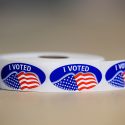Election 2020 experts: Voting systems, VP debate, more
The University of Wisconsin–Madison offers a number of experts, story angles and resources for media covering Election 2020, including about creating resilient voting systems, the vice presidential debate and more.
For more Election 2020 resources and experts, visit https://elections.news.wisc.edu/
Guidelines for resilient voting systems
As cities and other municipalities prepare for a 2020 presidential election that will be unlike any before it, set against the backdrop of a pandemic, they face dilemmas in how to structure and staff their in-person polling places: How can they best protect voters and poll workers from COVID-19? How do they minimize wait times? What if there are shortages of poll workers? Should they consolidate polling locations or turn to sports arenas as voting sites?
Laura Albert, a professor of industrial and systems engineering at the University of Wisconsin–Madison, and PhD student Adam Schmidt have analyzed some of the options in a report they’ve shared with the Wisconsin Elections Commission ahead of the Nov. 3 election. Read the full story here.
Contact: Laura Albert, laura@engr.wisc.edu
Election Integrity Project
The Election Integrity Project is a nonpartisan initiative of the Wisconsin Center for Investigative Journalism and the Center for Journalism Ethics at UW–Madison in collaboration with First Draft and with the support of Craig Newmark Philanthropies.
The Project provides guidance to journalists and citizens on dealing with election misinformation and disinformation online and aims to counteract efforts that could strip citizens of their power through investigative reporting on voting issues in Wisconsin.
The latest, Consumer Toolkit, is available here.
Katy Culver, kbculver@wisc.edu
Experts available
Allison Prasch, an expert on U.S. presidential rhetoric, foreign policy, national identity, and political communication is available to talk about the history of presidential health crises. Contact: aprasch@wisc.edu
Franciska Coleman is an assistant professor of law. She can comment on and an expert on the Black Lives Matter movement on questions of police legitimacy inside community-police dialogues. Coleman is available for analysis of how the Breonna Taylor decision might be interpreted by affected communities and others.
Contact: facoleman@wisc.edu
The vice-presidential debate
The following experts are available to the media for analysis on the vice-presidential debate.
- Barry Burden, director of the Elections Research Center and professor of political science, is available to discuss the content and political impact of the debate. Contact: bcburden@wisc.edu
- Kathy Cramer is a professor of political science. Cramer, an expert on civic engagement and political discussion is available to talk about what she hears from supporters of President Trump on conservative talk radio and the potential impact of the VP debate. Contact: kathy.cramer@wisc.edu
- Steven Deller is a professor of agricultural & applied economics. Deller, an expert on economic growth and rural economies, can discuss the impact of COVID-19 on Wisconsin’s rural counties. Deller’s recent report, “WIndicators: Impact of COVID-19 on the Wisconsin Economy,” can be found here. Contact: scdeller@wisc.edu
- Linda Greene is Evjue Bascom professor of law. Greene, an expert on constitutional law, civil rights, race and police use of force, can offer analysis of how the candidates choose to discuss racialized police violence and what the death of Ruth Bader Ginsburg will mean for the U.S. Supreme Court. Contact: Linda.S.Greene@wisc.edu
- Baron Kelly is a professor of theatre and drama. Kelly, an expert on theatre and stagecraft, can discuss the positions of status on stage and the Black Lives Matter movement as it relates to theatre and the arts. Contact: baronkelly@wisc.edu
- Ryan Owens is a professor of law and director of the Tommy G. Thompson Center on Public Leadership. Owens is available to comment on the future of SCOTUS and the nomination of Amy Coney-Barrett.
- Allison Prasch is an assistant professor of communication arts. Prasch, an expert on presidential rhetoric, will look at the coming debate in terms of narrative, character, language and use of symbolism. Contact: aprasch@wisc.edu
- Ajay Sethi is an associate professor of population health sciences. Sethi, an expert in public health and infectious disease epidemiology, will discuss conspiracy theories and misinformation in public health during the COVID-19 pandemic. Contact: ajay.sethi@wisc.edu
UW–Madison experts can comment on current topics in the news. More experts can be found on the UW–Madison Experts page.

